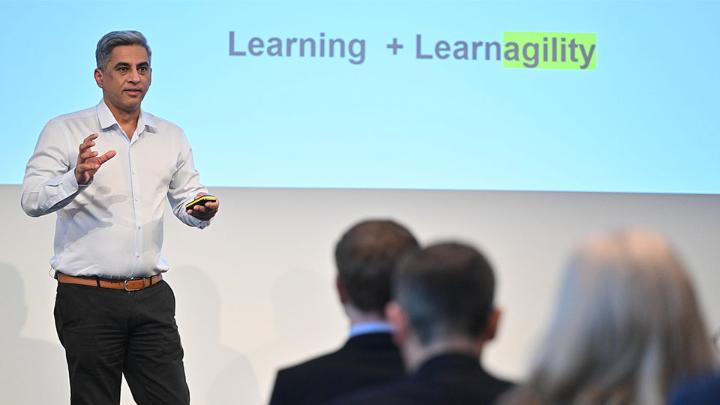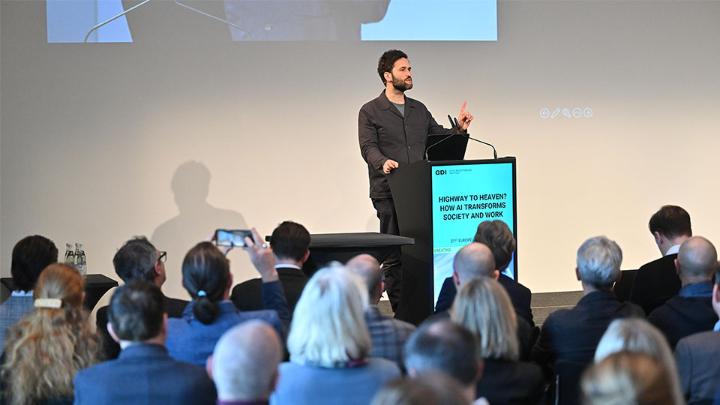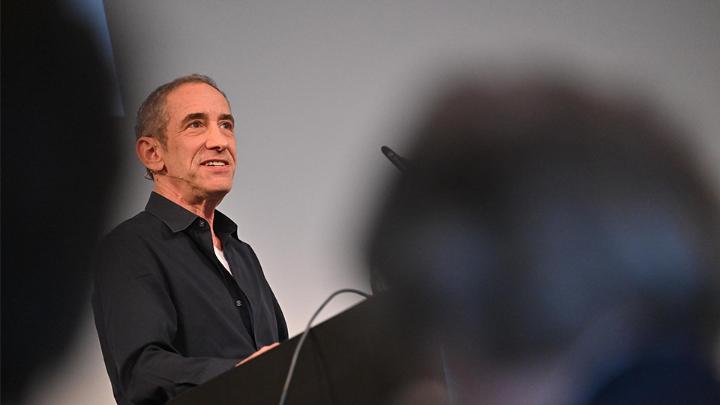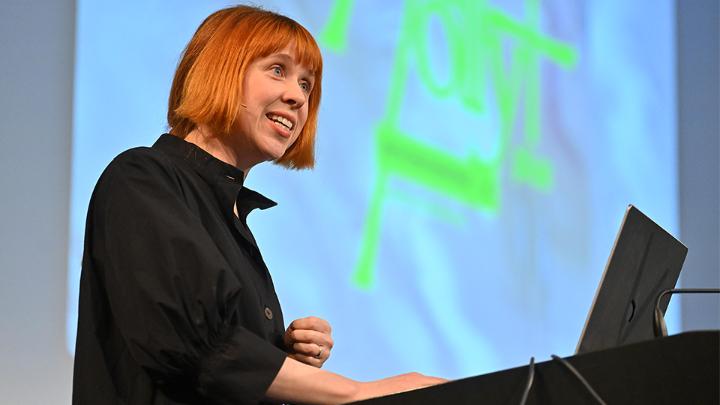Can AI produce innovation? Carl Benedikt Frey, Professor of AI and Work at Oxford University, does not believe the use of existing technology will be enough to deliver long-term success. Growth ultimately depends on inventions that create new industries and jobs. AI draws on existing data points, producing hardly any genuine innovations. “If we could travel back in time, AI wouldn’t have invented flying,” underlined Carl Benedikt Frey. Automating what already exists isn’t enough as new solutions must always be sought. AI is nonetheless constantly pushing the boundaries of what was previously thought possible. Daniel Susskind, a Professor in Economics at King’s College London, expects this trend to persist. This means it’s really a question of when rather than whether the world of work will change.
Valuable future-oriented knowledge
Daniel Susskind deems adaptation and flexibility to be crucial skills too. As AI technology is developing at such a rapid pace, it is hard to predict which skills will still be useful in future. A few years ago, young people were being taught coding to equip them for the future. However, AI is already carrying out this task to a great extent today. AI also lowers entry barriers, benefiting beginners more than experts. Uber is a good example of this phenomenon – while experienced taxi drivers’ in-depth knowledge of every street suddenly lost its value, new Uber drivers without many years of experience could do the job well using GPS systems directly. Modern ICT has reduced global inequality over recent years. Carl Benedikt Frey raised the question of whether AI will reverse or reinforce this trend.

Machine systems are already superior to humans when it comes to accessing specific specialist knowledge. So how can we succeed in this new world of work? Manu Kapur, Professor of Learning Sciences and Higher Education at the Swiss Federal Institute of Technology Zurich, believes education still plays a crucial role. Expertise includes both explicit and implicit knowledge, such as critical thinking or that well-known gut instinct. Both elements are linked as part of an adaptive process. For example, while the invention of the pocket calculator has made mental arithmetic less important, critical thinking in maths requires a fundamental understanding of the subject. In Manu Kapur’s view, a combination of knowledge transfer and explorative learning fosters conceptual thinking and our ability to adapt.
When machine systems take over the work
In view of low profit margins in many sectors and the shift of labour to other countries, Frey underlined that new ways of working are needed to maintain growth. Susskind indicated that unemployment is a realistic future scenario. If machine systems take over the performance of our work, he pointed to three key potential challenges. The first issue concerns the allocation of wealth – how do we distribute the wealth between ourselves if the labour market cannot provide employment for everyone? He identified the political power of largely unregulated companies as a second challenge. The third issue highlighted is a loss of purpose without work.

AI rules the world - so what now?
Daniel Susskind believes the state has a crucial role to play as a regulatory authority in a future dominated by AI. Douglas Rushkoff, Professor of Media Theory and Digital Economics at the City University of New York, took a different view. In his view, the solution lies in a return to greater social cohesion. People are less dependent on companies in strong local communities which means they exert less power over the individual. Instead of looking to the state for support, we need to adopt a community-minded approach again. In an AI-dominated world, being human becomes all the more important. Values such as empathy and helpfulness, for example, are beyond the capabilities of machine systems. Douglas Rushkoff summed up: “time isn’t the ticking of the clock, it’s the gaps between the ticks.”

Nora Bateson, founder and president of the International Bateson Institute, also contended that perception must extend beyond algorithms. While AI is part of our reality, she applies the warm data theory to analyse the space between 0 and 1 because the world does not consist of isolated data points, but is instead a network of relationships. Maya Ben Dror, co-founder and COO of ComplexChaos, believes AI technologies possess the potential to enable us to overcome major crises together. In a rapidly evolving world, we need to eliminate silos and create a culture of trust and cooperation based on smart systems.
Unprecedented challenges
The deployment of AI presents new challenges in various industries. For example, images, voice and text are being used to create a database for the training of AI models without the consent of the artists who produced the material. Holly Herndon, a composer, musician and sound artist, demonstrated that obtaining explicit consent (opt-in procedure) is very difficult to implement. In response, she has developed an opt-out solution enabling users to exclude their own content from such databases. New AI tools are creating a shift in companies’ control over brands and content. Max Lederer, Chief Innovation Officer at Jung von Matt Germany, illustrated how fans have increasingly been generating their own content for brands in recent years. This forces companies to act, but also presents huge potential for interaction.
Creative space

As well as critically analysing copyright law, Holly Herndon has also been focusing on the convergence of AI and art for a number of years. She believes AI opens up fresh opportunities for creative collaboration, interaction with her fan community and completely new art forms where the technology is used as a medium. By handling the performance of repetitive tasks, Jakub Samochowiec, Senior Researcher at the Gottlieb Duttweiler Institute, believes AI systems generate added value by allowing room for creativity. In a similar way, the invention of the camera did not result in the extinction of art, but instead led to a development from realism to expressionism. He nevertheless encourages people to use machine tools for more than simply convenience. Confidence in our own abilities will be a key factor if we are to remain relevant in future. This is vitally important, especially in decision-making processes. Otherwise, we risk losing the capacity for originality, variance and critical thinking.
Outlook
We look forward to welcoming you to the 22nd European Trend Day on 25 March 2026.
For more inspiration, register now for the 5th International Food Innovation Conference on 19 June 2025 or visit us at the 75th International Retail Summit on 10 and 11 September 2025 at the Gottlieb Duttweiler Institute.